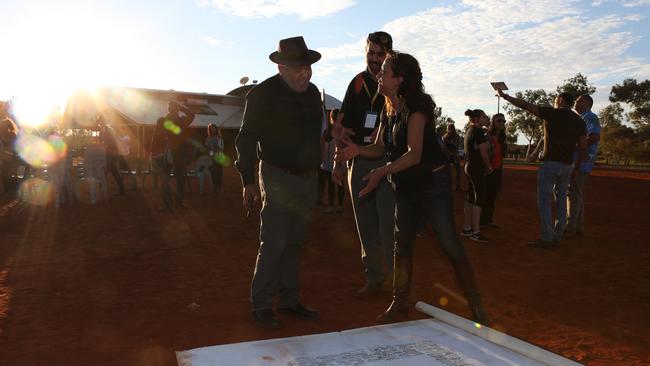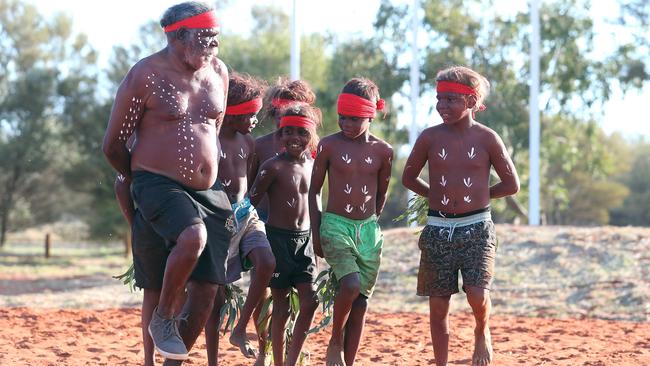Why blackfellas need a voice in Parliament
PARLIAMENT has the right to make laws about us, so the least we deserve is a voice on the inside, writes Sean Gordon. Not the power of veto, just a voice.

Rendezview
Don't miss out on the headlines from Rendezview. Followed categories will be added to My News.
THE Referendum Council report on Indigenous constitutional recognition calls for a First Peoples voice to Parliament to be enshrined in the Constitution, to guarantee Aboriginal and Torres Strait Islander Australians a say on laws and policies made about Indigenous affairs.
Before the incorrect assumptions and misrepresentations begin, let me break the proposal down.
I’ll start with the big one: why should any group have ‘special treatment’? Why should blackfellas have a voice to Parliament?
Aboriginal and Torres Strait Islander peoples are the only group that was here before the British arrived. They were here for more than 60,000 years. They were the only group that got dispossessed. They were the only group that got singled out and excluded in our Constitution of 1901.
Because of this history, Parliament makes special laws about Aboriginal and Torres Strait Islander peoples — like Native Title, to recognise their land rights, and cultural and heritage protection, or closing the gap policies. These laws are needed to address the past discrimination and to address the ongoing disadvantage of my people.
Australia’s Constitution gives Parliament the power to make these laws. This is a necessary power. But it doesn’t empower my people with a voice in those laws, and so the laws are not as fair or effective as they could be.
The closing the gap measures aren’t working, despite the money spent. Native Title laws often inhibit economic development. Government makes decisions about our people, without listening to us effectively. The result is waste and inefficiency.

Now, if you were a member or a group of Australians who were the original people of this great land, and who now get special laws and policies made about you to address your problems and circumstances, would you want a say in those laws and policies? Or would you want Parliament to make those decisions without at least hearing what your people have to say first?
Of course, you would want to have a say when Parliament makes laws about you. That is all that this voice to Parliament is about.
You might now think, well, why not remove that power from Parliament to make special laws for one group? Sounds simple but it isn’t.
Parliament needs a constitutional power to enact laws like the Native Title Act. Otherwise Parliament might not be able to amend that Act, or it might be subject to a High Court challenge. We should avoid that kind of uncertainty. Parliament needs to be able to manage Indigenous affairs, and it needs a power to do so — but it needs to consult and talk to Indigenous people when it does.
Australia has signed up to the UN Declaration on the Rights of Indigenous Peoples. That Declaration recognises how important it is for governments to hear what Indigenous people have to say before making decisions about their rights.
Some people say: we have Indigenous MPs in Parliament, and they are the First People’s voice. Wrong, they are not. They are not elected by Indigenous people. They are elected by all Australians. They must represent their electorates, their constituencies and their political allegiance — just like a Greek Aussie MP or an Indian Aussie MP.
Our people want an independent First Peoples voice outside Parliament, outside the machine of party politics, because our people and communities want to take responsibility for our own problems. We want a fairer more equitable relationship with government. We want to have a fair say in laws made about us, because we want to improve those laws, and improve the terrible outcomes in our affairs.
That is why we decided at Uluru that this voice to Parliament was what we want. We decided that we want the Constitution to guarantee that there will be a First Peoples body that can have a voice to Parliament when they go about making special laws about us.
It is not asking much. It would not be a veto. Just a voice.
We are the original peoples of this great land. Parliament makes laws about Indigenous affairs. We just want a fair say in those laws.
Sean Gordon is chief executive of the Darkinjung Local Aboriginal Land Council and Chair of Uphold & Recognise.


